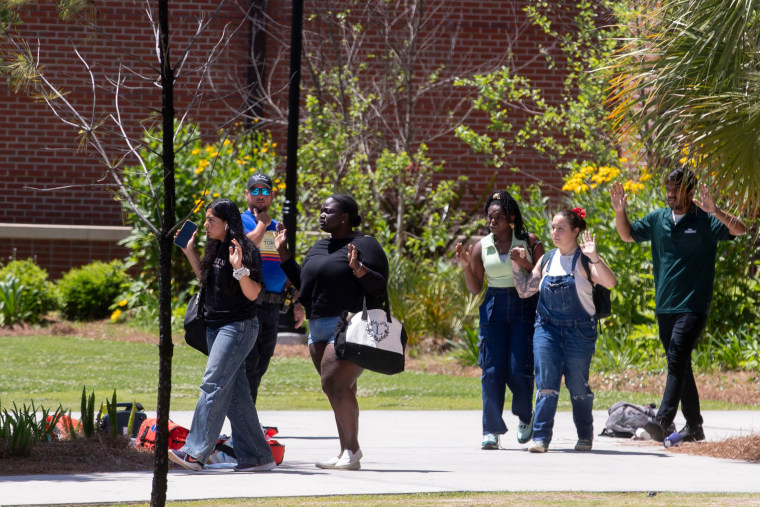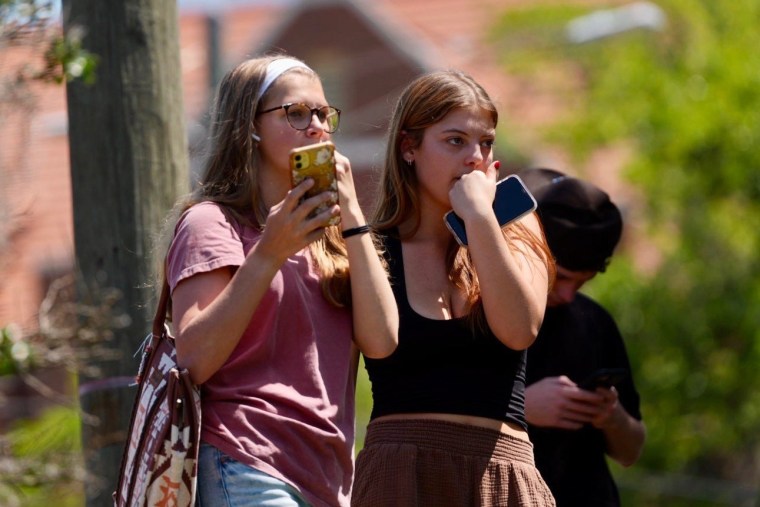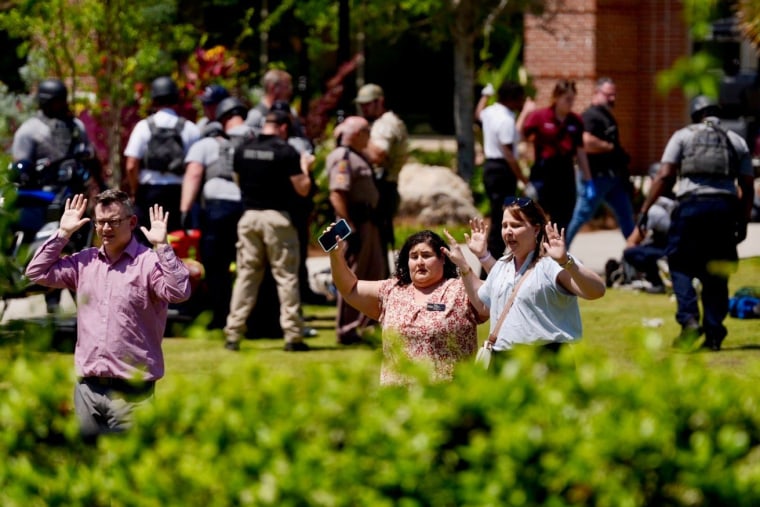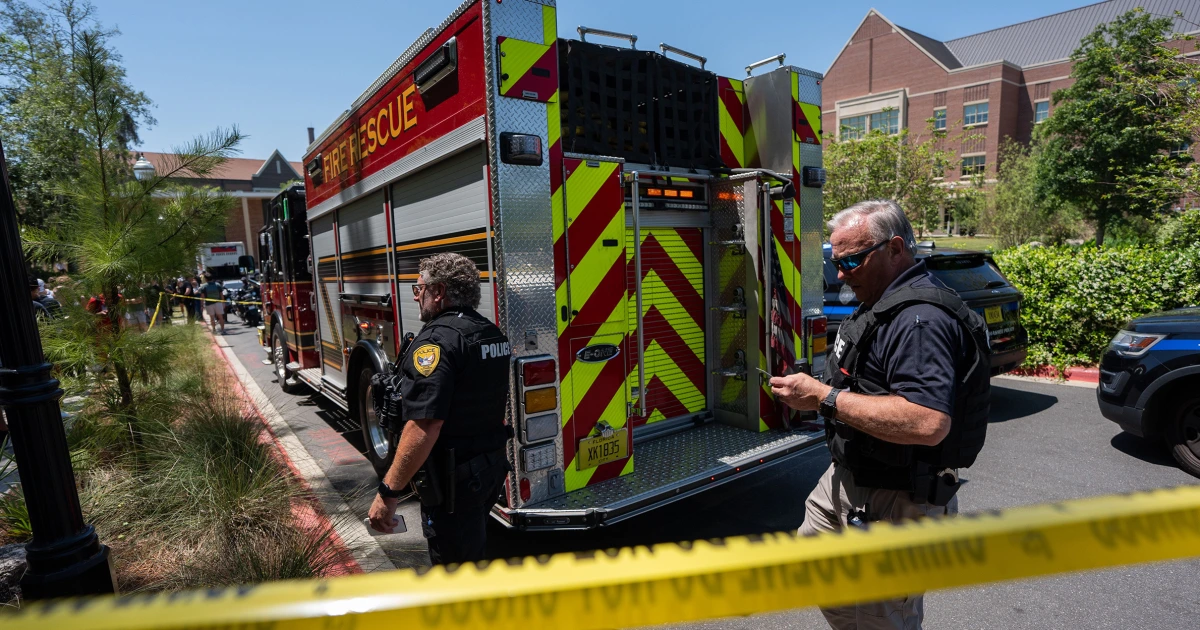The suspect in the Florida State University shooting that left two people dead and several others wounded is the stepson of a sheriff’s deputy and Trump supporter who harbored white supremacist views and had a troubled childhood, officials and classmates said Friday.
Phoenix Ikner, 20, who is believed to be an FSU student and was arrested in the aftermath of Thursday’s shooting, was treated for multiple mental and physical health issues as a child and was at the center of a years-long custody battle, court documents from 2015 obtained by NBC News revealed.
Ikner allegedly used one of his stepmother’s weapons — a handgun — to wreak havoc on the campus, police have said.
Officials said that Ikner’s mother had purchased her former service weapons and that it was her personal property at the time of the shooting.
Police said the gunman also had a shotgun but have not yet confirmed whether it was used. A motive has not been identified.
“There does not appear to be any connection between the shooter and again, even one of the victims,” Tallahassee Police Chief Lawrence Revell told reporters Friday.
It was not a surprise that Ikner had access to a weapon, Leon County Sheriff Walt McNeil said earlier, as he was a member of the sheriff’s office’s citizen advisory or youth advisory council.
The Leon County Sheriff’s Office described the council as a means to “provide an open line of communication between the youth of Leon County and local law enforcement” in a news release announcing its 2021-22 class.

Students are escorted out of the Florida State University Student Union after a mass shooting occurred, in Tallahassee, Fla., on Thursday.Mishalynn Brown / Tallahssee Democrat via USA Today Network
The gunman opened fire near the student union around 11:50 a.m., FSU Police Chief Jason Trumbower said. He shot multiple people, killing two, before FSU police were able to engage, neutralize and apprehend him.
One of the victims was identified Friday as 57-year-old Robert Morales. Morales was working as FSU’s dining coordinator and worked in the student union center.
“The suspect continues to receive treatment at one of our local hospitals,” Revell said. “He did receive significant injuries in this event, and will require a significant amount of time in that facility. Once he is released from that facility, he’ll be taken to a local detention facility where he will face the charges up to and including first degree murder.”
A student who witnessed the gunman approach campus and begin opening fire said the shooter pulled up to campus in an orange Hummer and got out, holding a rifle and shooting in her direction.
“I think he was shooting and he missed. So he goes back into his car and grabs a pistol, then he turns and shoots the lady in front of him. That’s when I just started running,” McKenzie Heeter, a junior at FSU, told NBC News.
Heeter described the shooter as a “normal college dude.”
In June 2020, Ikner changed his name to Phoenix Ikner from his previous name, Christian Gunner Eriksen, an FBI official told NBC News.
Classmates say suspect had white supremacist views
Ikner is a registered Republican, according to public voter records. He registered in 2022, midway through President Joe Biden’s term in office, records show.
Reid Seybold, a senior at FSU who was around the corner from the shooting when it unfolded, said he knew Ikner from a political discussion group at Tallahassee State College, where he spent the first two years of his education before he transferred to FSU.
Seybold, the group’s president, said Ikner was asked not to return to the group because of views that Seybold said aligned with white supremacy.
“He espoused so much white supremacist rhetoric and far-right rhetoric, as well,” Seybold said.
Since then, Seybold said, he has seen Ikner only a couple of times in passing.
The current president of the same club, Riley Pusins, said that at meetings, the suspect advocated for President Donald Trump’s agenda and often promoted white supremacist values, even though the club was nonpartisan and was about debate and political discourse.
Pusins said many people in the club had labeled the suspect, who attended regularly as recently as last semester, as a fascist.
After the meetings, Pusins said, the suspect often made more “inappropriate” comments. He would “go up to the line” in the meeting and then cross the line in comments made after the fact, Pusins said.

Evacuees watch law enforcement on Florida State University campus after a shooting on Thursday.Alicia Devine / Tallahassee Democrat via USA Today Network
Seybold said he was working on a group project when he heard about the shooting. He said he immediately locked down in the classroom where he was working as he heard gunfire nearby.
“I was texting everybody I loved, letting know that I loved them. I was getting ready to die, which was harrowing,” Seybold said.
“I don’t know why he would have done something like this,” Seybold said. “I don’t know where it would have come from, but I’d sure like to find out.”
Lucas Luzietti, a junior studying political science, shared a national government class with Phoenix Ikner in 2023 at Tallahassee State College.
He recalled how Ikner shared hateful comments about minorities and denied the 2020 election.
“He espoused the election denialism belief that Joe Biden was not the legitimate president, he said that Rosa Parks was in the wrong, he also talked about how Black people are ruining his neighborhood and Stonewell was bad for society. He would also talk about how multiculturalism is dangerous,” Luzietti told NBC News Friday.
“Everyone [in the class] would just look at each other like, ‘Did he really just say that?’” Luzietti recalled. “I got into an argument with him over the legitimacy of the 2020 election because I felt that one was especially dangerous to the fabric of our democracy.”
In that class, Ikner had spoken about having a gun.
“He would joke about mass violence. I don’t remember specific quotes but I know he would laugh about violence against minorities. And he did talk about how he used guns and had access to them,” Luzietti said.
In January, Ikner was quoted in FSU’s student newspaper in a story about anti-Trump protests that took place a week before the presidential inauguration.
The rally, organized by Tallahassee Students for a Democratic Society, also called for an end to the war in the Gaza Strip and “racist attacks on immigrants,” the article says.

Evacuees on Florida State University campus after a shooting on Thursday.Alicia Devine / Tallahassee Democrat via USA Today Network
“These people are usually pretty entertaining, usually not for good reasons,” said Ikner, who was described as a political science major, according to an archived online report from FSUnews.com. “I think it’s a little too late, he’s [Trump] already going to be inaugurated on Jan. 20 and there’s not really much you can do unless you outright revolt, and I don’t think anyone wants that.”
After Thursday’s shooting, the student newspaper removed Ikner’s quote from the article “at the decision of our editors to maintain ethical journalistic standards and avoid amplifying the voice of an individual responsible for violence.”
Custody battle and health problems
Ikner, according to the court documents, was treated for multiple mental and physical health issues as a child and was at the center of a years-long custody battle.
His biological mother, named in a sheriff’s affidavit as Anne-Mari Eriksen, is a U.S.-Norwegian dual national. She was charged with removing a minor from the state contrary to a court order after taking him from Florida to Norway.
It had been agreed that Eriksen would take her then-10-year-old son to South Florida for spring break, the court filing says.
“Instead of staying in South Florida, the defendant allegedly fled the country with him in violation of their custody agreement,” the court filing says.
The filing added that the boy had “developmental delays and has special needs” that his father, Christopher Ikner, feared would not be properly dealt with without access to doctors in the U.S.
These conditions included a growth hormone disorder and ADHD, the filing says.
Eriksen then failed to return Ikner to his father at the agreed-upon time in March, staying in Norway for several more weeks, according to the filing.
On April 21, 2015, the court ordered his biological mother to return to the country with Ikner after the father had filed an emergency order, The pair returned to Florida at some point after that.
A separate document from June 2015 indicates that Eriksen pleaded no contest to the charge and was sentenced to 200 days in prison, of which she had already served 170 days, followed by two years of “community control” and two years of probation.
Eriksen was also ordered not to contact the family or her son’s school for the length of the sentence.
